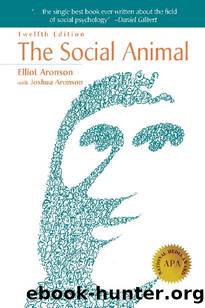The Social Animal by Elliot Aronson & Joshua Aronson

Author:Elliot Aronson & Joshua Aronson [Aronson, Elliot & Aronson, Joshua]
Language: eng
Format: epub
Publisher: Worth Publishers
Published: 2018-02-19T00:00:00+00:00
By this definition, we humans have proven ourselves to be a particularly aggressive species. No other animals so consistently and wantonly hit, torture, and kill members of their own kind. For centuries, philosophers have debated why this is: Is aggression an inborn phenomenon, or must it be learned? Thomas Hobbes, in his classic work Leviathan (first published in 1651), took the view that we human beings, in our natural state, are brutes and that only by enforcing the law and order of society can we curb what to Hobbes was a natural instinct toward aggression. In contrast, Jean-Jacques Rousseau’s concept of the noble savage (a theory he developed in 1762) suggested that we human beings, in our natural state, are gentle creatures and that it is a restrictive society that forces us to become hostile and aggressive. Hobbes’s more pessimistic view was elaborated in the twentieth century by Sigmund Freud,3 who theorized that human beings are born with an instinctual drive toward life, which he called eros, and an instinctual drive toward death, thanatos, leading to aggressive actions. About the death instinct, Freud wrote, “It is at work in every living being and is striving to bring it to ruin and to reduce life to its original condition of inanimate matter.”
This age-old dispute about human nature prompts me to raise the following questions that I will attempt to answer in this chapter: Is aggression inborn — is it part of our very nature as human beings? Can aggression be modified? Are women as aggressive as men, though presumably in different ways? What are the social and situational factors that increase or decrease aggression? Today, psychological scientists across many disciplines understand that “aggression” is both biological and learned, part of our evolutionary heritage — and so are the countervailing forces that promote altruism and cooperation. Let’s look at some of the many factors that influence — or discourage — the expression of aggression.
Download
This site does not store any files on its server. We only index and link to content provided by other sites. Please contact the content providers to delete copyright contents if any and email us, we'll remove relevant links or contents immediately.
Rewire Your Anxious Brain by Catherine M. Pittman(18656)
Talking to Strangers by Malcolm Gladwell(13370)
The Art of Thinking Clearly by Rolf Dobelli(10489)
Mindhunter: Inside the FBI's Elite Serial Crime Unit by John E. Douglas & Mark Olshaker(9344)
Becoming Supernatural by Dr. Joe Dispenza(8217)
Change Your Questions, Change Your Life by Marilee Adams(7783)
Nudge - Improving Decisions about Health, Wealth, and Happiness by Thaler Sunstein(7709)
The Road Less Traveled by M. Scott Peck(7603)
The Lost Art of Listening by Michael P. Nichols(7506)
Mastermind: How to Think Like Sherlock Holmes by Maria Konnikova(7347)
Enlightenment Now: The Case for Reason, Science, Humanism, and Progress by Steven Pinker(7314)
Win Bigly by Scott Adams(7199)
The Way of Zen by Alan W. Watts(6614)
Daring Greatly by Brene Brown(6514)
Big Magic: Creative Living Beyond Fear by Elizabeth Gilbert(5774)
Grit by Angela Duckworth(5615)
Ego Is the Enemy by Ryan Holiday(5450)
Men In Love by Nancy Friday(5240)
The Laws of Human Nature by Robert Greene(5208)
